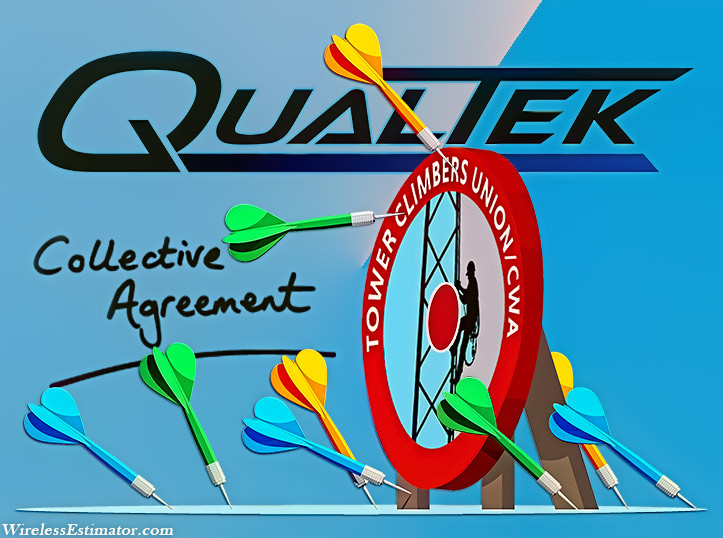
WAITING FOR QUALTEK – The Tower Climber’s Union of the CWA heralded their first company office location that voted to become unionized on May 23, 2022. They’ve been silent ever since.
The Communications Workers of America (CWA) appears to have been unable to negotiate their first Tower Climbers Union collective bargaining agreement with QualTek Wireless after QualTek closed their wireless Henderson, Nevada office that employed eight eligible tower technicians, the majority voting to join the union in May of 2022.
With dozens of offices operating throughout the nation, QualTek would have been the ideal linchpin for CWA to increase their telecom presence since the company is a turnkey provider of fiber optic infrastructure services, including program management and engineering, resources that can tap into the nation’s $42.5 billion BEAD funding.
Affirmative vote provided a minuscule entry into infrastructure development industry
On May 23, 2022, four votes were cast by QualTek techs for joining the CWA, and two voted against unionization. Of the four technicians, at least two are currently employed elsewhere, according to research by Wireless Estimator.
CWA could have also increased its membership in fiber optic-centric Frontier Communications and other internet service providers. Still, the union turned against Frontier last year, accusing them of shoddy unsafe work, possibly to leverage negotiations for upcoming contracts.
CWA cautions Arizona only use reliable companies, possibly excluding Frontier’s contractors
In an attempt to maintain relevance, CWA announced last week the launch of a 30-second video that has had 123 views in the past seven days that encourages the Arizona Commerce Authority (ACA) to ensure that the nearly $1 billion in federal broadband funding the state has been awarded is given to “reliable companies with highly-trained workers.”

The Arizona Commerce Authority has preempted CWA’s out-of-state contractors concerns with its BEAD Initial Proposal Volume ll draft. CWA is asking that the ACA establish the strongest possible labor standards for funded projects and rigorously evaluate the technical capabilities and track records of the internet service providers who apply as well.
However, earlier this month, the ACA released a 123-page working draft of Arizona’s BEAD Initial Proposal Volume ll for public comment, one of the most comprehensive state plans in the nation that covers labor standards and protection (Beginning on Page 66) and workforce readiness (Pages 72 – 84).
Although the ACA emphasizes in its draft that it would like to see funding benefit the state’s workforce, there is nothing preventing awards to out-of-state subcontractors if, among other requirements, employees possess the necessary skills and qualifications.
Kiewit and MasTec would take offense at being aligned with “fly-by-night” contractors
The CWA spokesperson in its ad said, “…fly-by-night contractors from out of state” are “not invested in a quality network for Arizona,” and “Arizona wants broadband done right.”
Depending upon the size of the project, some Arizona broadband companies will have to bring in companies from out of state to complete their buildout as quickly as possible since speed to employment is a secondary selection criterion for priority and non-priority projects.
In addition, many companies will use locally-based talent to complete projects in another state where projects have already been let with aggressive completion deadlines.
With fiber installations expected to consume the more significant portion of BEAD funding, contractors like Kiewit Infrastructure West Co. of Phoenix, which completed a $20.6 million conduit and fiber installation for ADOT earlier this year, are likely exploring BEAD opportunities nationwide
With locations in 28 states, Kiewit has one of the largest privately-owned fleets of construction equipment in North America, allowing the company which had $10.3 billion in revenue in 2022, to rapidly mobilize the necessary resources for any project from other states, including professional workers that take ownership of a project no matter what state they are working in.
Another leader in broadband construction is MasTec Network Solution, based in Coral Gables, Florida, with an office in Gilbert, Arizona. Similarly, their 28 offices in the U.S. will share resources and provide the same services no matter what state they are located in.
Is Frontier still on CWA’s unsafe and botched rollouts list?
In their request to ACA, the CWA said, “In order to ensure buildout and deployment is done safely, correctly, and transparently, funding must go towards internet service providers that have strong training and safety programs, provide high-quality wages and benefits, and have proactive practices to ensure compliance with state and federal safety, labor, and civil rights laws.”
It’s unlikely that Frontier Communications will get an endorsement from the CWA that the internet service provider meets all of those assurances, even though CWA represents roughly 8,000 Frontier employees nationwide.
Last year, the CWA ran a half-million-dollar ad campaign that Frontier was increasingly outsourcing union jobs to subcontracting companies, “putting public safety at risk,” citing a 48-hour service outage in Arizona, cutting off tens of thousands of people from 911 services. They said that the dangerous use of subcontractors damaged communities amid botched rollouts.
“Amid a nationwide broadband buildout – one that the federal government has invested over $65 billion in through the infrastructure bill – this is wholly unacceptable. Many of these contractors come from out of state, are paid a fraction of what CWA union members earn, and the state has no oversight of them when it comes to public safety or quality of work,” said CWA District 1 Vice President Dennis Trainor, who represents approximately 1,600 workers in Frontier’s home state of Connecticut.
In August, Frontier closed its fiber securitization notes offering as part of a $2.1 billion financing. Frontier is the first publicly traded company in the U.S. to secure funds backed by fiber-to-the-home assets.
Frontier created a new entity separate from its primary operations that wouldn’t be affected if the parent company were to go bankrupt.
To date, it’s a tenuous Tower Climbers Union
In July, the Tower Climbers Union (TCU)/CWA launched their new local, CWA Local 9424, that has a national charter with jurisdiction for all workers employed in all tiers of the telecommunications tower industry. It is in CWA District 9 which is responsible for servicing all CWA locals in California, Hawaii and Nevada where TCU hasn’t announced any agreement inked by QualTek.
In 2022 when the TCU received its certification from the National Labor Relations Board, then CWA President Chris Shelton, in a statement provided to Wireless Estimator, said, “Now it is time for QualTek to show these workers the respect they deserve and bargain a fair contract.”
Although bargaining a contract in construction takes an average of over 420 days, it has been approximately 550 days without any agreement announcement.
Many communications infrastructure contractors have vocally opposed unionization, stating that the additional costs would require them to shutter their business.
The TCU claims otherwise, with one union organizer last year informing Wireless Estimator, “We can actually show QualTek how increased company-wide safety and other measures can increase their bottom line.”
It appears that it hasn’t worked for Frontier. The company emerged from Chapter 11 bankruptcy in May of 2021, to focus on converting its slow and aging copper-based telecom network to a next-generation network built on fiber optic cable, oftentimes using subcontractors.
Burdened by a hefty debt load from successive acquisitions and burning cash, Frontier filed for bankruptcy protection a year earlier, allowing the company to eliminate some $11 billion in debt.
Approximately half of Frontier’s 16,200 employees are represented by the CWA. In District 9, a new contract with Frontier was signed on September 1, 2023, with 59.11% of union members ratifying it and 40.89% voting against it. For workers and company owners who have never reviewed a union agreement, it’s an eye-opener.
The CWA did not respond to a request for additional information.


















